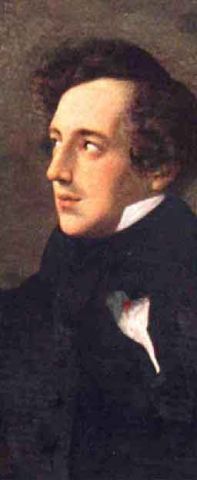 Felix Mendelssohn (1809-1847) was a musical wunderkind, a prodigy who was performing by age 9, composing symphonies by age 12, and publishing works by age 13. He was largely responsible for the revival of interest in Bach after decades of neglect, because it was his conducting the St. Matthew Passion that helped place that composition back in its central place in musical history. But he was no studio rat: he was a classically educated, well-rounded person.
Felix Mendelssohn (1809-1847) was a musical wunderkind, a prodigy who was performing by age 9, composing symphonies by age 12, and publishing works by age 13. He was largely responsible for the revival of interest in Bach after decades of neglect, because it was his conducting the St. Matthew Passion that helped place that composition back in its central place in musical history. But he was no studio rat: he was a classically educated, well-rounded person.
Consider, for instance, the care he put into composing not just the music but the text for his oratorio on the life of St. Paul. Mendelssohn enlisted the help of theologians and poets, but he took personal responsibility for the libretto’s finished form. He not only saturated himself in the relevant biblical texts, but he also read up on historical reconstructions of earliest Christianity. Mendelssohn’s family had converted from a cultural Judaism to what was for Felix a heartfelt Lutheran Christianity, and he seems to have formed a bond of identification with the rabbi Saul who became the apostle Paul. He insisted on using hymn-like chorales in the composition, so that, as in Bach’s passion, the audience would have a clear time to respond actively to the drama.
Years after finishing his Paul oratorio, Mendelssohn wrote to one of the theologians who had helped him with it. Here is part of that letter:
Dear Schubring,
I wish to ask your advice in a matter which is of importance to me, and I feel it will therefore not be indifferent to you either, having received so many proofs to the contrary from you. It concerns the selection of a subject of an oratorio, which I intend to begin next winter. I am most anxious to have your counsels, as the best suggestions and contributions for the text of my “St. Paul” came from you.
Many very apparent reasons are in favour of choosing St. Peter as the subject,—I mean its being intended for the Diisseldorf Musical Festival at Whitsuntide, and the prominent position the feast of Whitsunday would occupy in this subject. In addition to these grounds, I may add my wish (in connection with a greater plan for a later oratorio) to bring the two chief apostles and pillars of the Christian Church side by side in oratorios, —in short, that I should have a “St. Peter” as well as a “St. Paul.” I need not tell you that there are sufficient internal grounds to make me prize the subject, and far above all else stands the outpouring of the Holy Ghost, which must form the central point, or chief object. The question therefore is (and this you can decide far better than I can, because you possess the knowledge in which I am deficient, to guide you) whether the place that Peter assumes in the Bible, divested of the dignity which he enjoys in the Catholic or Protestant Churches, as a martyr, or the first Pope, etc. etc.,—whether what is said of him in the Bible is alone and in itself sufficiently important to form the basis of a symbolical oratorio. For, according to my feeling, the subject must not be treated historically, however indispensable this was in the case of “St. Paul.” In historic handling, Christ must appear in the earlier part of St. Peter’s career, and, where He appears, St. Peter could not lay claim to the chief interest. I think, therefore, it must be symbolical; though all the historical points might probably be introduced,—the betrayal and repentance, the keys of heaven given him by Christ, his preaching at Pentecost—not in an historical, but prophetic light, if I may so express myself, in close connection.
My question then is, whether you think this possible, or at least so far possible, that it may become an important and personal object for every member of the community? —also, whether it is your opinion, that, even if actually feasible, it should be carried out entirely by means of Scriptural passages, and what particular parts of the Bible you would especially recommend for the purpose? Lastly, if in this event you will hereafter, as you previously did, make a selection of certain passages out of the Bible, and send them to me?
The chief thing, however, is the first point, for I am still in the dark about it; in fact, about the possibility of the whole undertaking: write to me as soon as you can on the subject. In thinking it over, my first idea was that the subject must be divided into two parts: the first, from the moment of forsaking the fishermen’s nets down to the “Tu es Petrus,” with which it must close: the second to consist of the Feast of Pentecost only; from the misery after the death of Christ and repentance of Peter, to the outpouring of the Holy Ghost.
Forgive me for assailing you so suddenly with all this…
Mendelssohn never carried out the St. Peter oratorio. Though attracted to some elements of Catholicism at times in his life, this composer of the Reformation Symphony was a decided Protestant, and was both grappling with the full symbolic power of St. Peter in his culture and also struggling as “the chief thing” to get the biblical image of Peter right. No doubt it would have been a great oratorio. Just watching Mendelssohn think his way through it in a personal letter is enough to teach you what a Christian musician with deep faith and a liberal education can do.